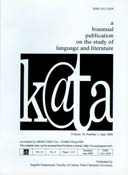Identity Crisis in Reza Ghasemi’s The Nocturnal Harmony of Wood Orchestra
DOI:
https://doi.org/10.9744/kata.22.2.93-100Keywords:
Keywords: Identity Crisis, Literature of Diaspora, Reza Ghasemi, Third-Space, Yuri LotmanAbstract
ABSTRACT
Migration, this multifaceted phenomenon, has always been a concept of importance in different domains such as art and literature. What impacts migration has on human psychology can be well elaborated on using the tool of characterization in stories. Among these impacts, the one regarding identity is probably of highest importance. Therefore, the literature of diaspora can be a field for exploring the process of identity refashioning. What the present study aims to elaborate on is Reza Ghasemi’s The Nocturnal Harmony of Wood Orchestra and the way identity crisis is manifested in and handled by the characters in this book. The analysis is grounded on Homi Bhabha’s concept of Third-Space but to specifically analyze the challenges that immigrant characters face in this liminal location, Yuri Lotman’s cultural idea of semiosphere is also incorporated.
Keywords: Identity Crisis, Literature of Diaspora, Reza Ghasemi, Third-Space, Yuri Lotman
Downloads
References
Bhabha, H. K. (1994). The location of culture. London: Routledge.
Borhan, A. (2016). Third-Space encounters and the possibility of resistance in selected multi-ethnic American novels, dissertation, Shiraz University, Shiraz.
Foucault, M., & C. Gordon. (1980). Power/knowledge: Selected interviews and other writings, 1972-1977. New York: Pantheon Books.
---. (1978). The history of sexuality. New York: Pantheon Books.
Ghasemi, R. (2013, Nov. 8). Encounter with the book. Hamid & Christina Moghadam Program in Iranian Studies, Stanford University. Retrieved form youtu.be/PtpzUihsqg0.
---. (2018, March 16). Raviun ninth book review session, Via Giambattista Bogino 9, Turin. Retrieved from youtu.be/4smj7j35hUY.
---. (2013, May 27). Philosophy and novel take different forms of intellectuality. Interview by Shahriar Mandanipour. The Center for the Great Islamic Encyclopedia, Retrieved from www.cgie.org.ir/fa/news/3153.
---. (2005). The Nocturnal harmony of wood orchestra. Tehran: Niloofar.
Gholami, A. (2002). The God of destruction. Hambastegi. 613, 7.
Jain, J. (2015). The diaspora writes home: Subcontinental narratives. Jaipur: Rawat Publications.
Jin, X. (1998). Across an ocean of words. Interview by John D. Thomas. Emory, 74 (1), 16.
Kavianpour, S. (2018). A post-modern narration of the dead’s life. Etemad, 4057, 10.
Khayef, E., & R. Nickfam, & B. Behin. (2015). Investigating modernistic elements in nocturnal orchestra of woods. European Journal of English Language and Literature Studies, 3(6), 1-10.
Khodayi, N. (2011). Presentation of the conflicts of society and identity in German migration literature. Research in Contemporary World Literature, 15 (60), 41-60.
Lotman, J. M. (1990). Universe of the mind: Semiotic theory of culture. Bloomington and Indianapolis: Indiana University Press.
Morrison, B. (2015, Nov 27). Too much information? The writers who feel the need to reveal all. The Guardian, Retrieved from www.theguardian.com/books/2015/nov/27/confessional-writing-memoirs-writers-feel-need-reveal-all.
Mousavi Iraie, M. S. (2017). An analysis of migrationlLiterature’s motifs in Reza Ghasemi’s the nocturnal harmony of wood orchestra and Abbas Maroufi’s completely special, thesis, Semnan University, Semnan.
Naficy, H. (1993). The making of exile cultures: Iranian television in Los Angeles. Minnesota: University of Minnesota Press.
Rastegar, E. (2012). From the invisible gardens. BBC Persian Television, Retrieved from youtu.be/oKx37CLB4pg
Rokach, A. (1990). Surviving and coping with loneliness. The Journal of psychology Interdisciplinary and Applied, 124 (1), 39-54.
Rutherford, J. (1990). Identity: Community, culture, difference. London: Lawrence & Wishart.
Sadeghi, L. (2004). Comparative research between the nocturnal harmony of wood, slaughterhouse- five, and blind owl. Kelk. 29 (149), 43-47.
Shahsavari, M. H. (2013, Dec. 16). The Eighth analysis session of best contemporary works of Persian Literature. Tehran Book Club, Arasbaran Cultural Center, Retrieved from www.mehrnews.com/amp/1767202
Singh, R. N. (1991). Loneliness: Dynamics, dimensions and many faces. International Review of Modern Sociology, 21 (1), 109-120.
Tafreshi Motlagh, L. (2010). Post-colonial studies in the immigration literature. Political Science Quarterly, (10), 211-222.
Venn, C. (2009). Identity, diasporas and subjective change: The role of affect, the relation to the other, and the aesthetic. Subjectivity, 26, 3-28.
Zohdi, E. (2018). Lost-identity; A result of 'hybridity' and 'ambivalence' in tayeb salih's season of migration to the north. International Journal of Applied Linguistics & English Literature, 7 (1), 146-1
Downloads
Published
How to Cite
Issue
Section
License
![]() This work is licensed under a Creative Commons Attribution License
This work is licensed under a Creative Commons Attribution License



.png)
.png)

















